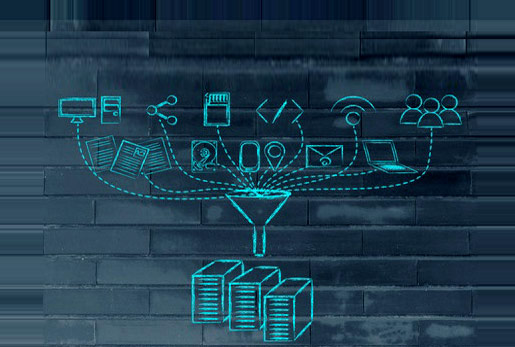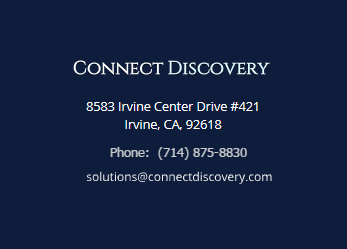eDiscovery is too complex. Most eDiscovery service providers have multiple individuals who are staffed on matters that have limited technical experience in core eDiscovery applications, and very limited experience in explaining, creating and consulting on eDiscovery project management with outside counsel. As a result, costs spiral out of control, outside counsel ends up being poorly informed, and cutting-edge legal technology solutions are either poorly utilized, underutilized or not utilized at all.
Our approach is very different. We offer the full suite of kCura's state of the art eDiscovery tool "Relativity" that allows outside counsel to collect process, analyze and produce data. Every matter at Connect is curated by an individual who has prior experience in project management working in biglaw firms on the "ground floor" of the intersection of law and technology. Further, each one of those individuals is certified in the core eDiscovery applications that they are utilizing.
This allows our clients to gain access to a wealth of experience that has been harnessed across hundreds of eDiscovery matters. The end result is that each matter is informed by best practices in eDiscovery project management by our team that patiently works to implement cutting edge legal technology, including big data analytics and predictive coding or technology assisted review ("TAR"), to realize dramatic efficiencies and cost savings.
eDiscovery is too slow. Whether it be the speed of the applications themselves, or the amount of time it takes for data to be ready for substantive review, eDiscovery can be very frustrating and time-consuming. In some cases due to the delays, outside counsel is put in a disadvantageous position by their adversary or miss critical court-appointed discovery deadlines. The current and already outdated approach which most eDiscovery service providers utilize is hosting a flurry of disparate eDiscovery applications via “on-premises” infrastructure that is frequently years old, underperforming and too expensive to replace. Invariably for outside counsel, this means the technology ends up being several years behind the most recent versions of the eDiscovery applications, or there are periods of inactivitiy due to unforeseen infrastructure-related delays, or that general slowness of the application occurs within the application itself during core business hours.
We believe that there is a better approach to managing eDiscovery technology – the “cloud”. Almost all technology companies outside of the eDiscovery space have adopted the cloud as their primary means of doing business and hosting business applications. At Connect, we embrace this model and manage our entire infrastructure via the cloud in Microsoft’s stated of the art cloud computing platform “Azure”. By utilizing our cloud computing architecture, our clients receive state of the art security (data is stored in ISO 27001 certified data centers), redundancy (data is backed up to regional data centers across multiple locations by the second), scalability (data is distributed across hundreds of concurrent servers) and speed of innovation (our applications are always on the most recent software version) associated with cloud computing that “on-premises” infrastructure could not possibly deliver. Additionally, rather than utilizing dozens of disparate eDiscovery applications, we instead tightly integrate the entirety of the eDiscovery process from collection, review, analysis, and production via the full suite of kCura’s “Relativity”. The end result is that our clients realize performance at a level much higher than our competitors, speed of document review within Relativity is much faster than the outdated approach of on-premises infrastructure, and the overall speed of the entire eDiscovery process is much faster due to our tightly integrated technology portfolio.
eDiscovery is too expensive. In a time where corporate legal departments and outside counsel are looking to realize cost-savings as much as possible, the eDiscovery services industry has held fast to the $18,000 per gigabyte approach. In the absence of corporations and outside counsel outright demanding cost-savings and change, the eDiscovery services providers have little incentive to begin discounting their costs. The end result is that clients end up paying far more for their matters than initially anticipated because their service providers costs are so high, or their matters are being filled with completely unnecessary costs for work that didn’t need to be performed.
At Connect, we take a very different approach. Our costs have been intentionally priced between 35% to 50% lower than our industry competitors. We are able to meet these costs as a function of our size, our project management workflows and our unique approach to managing eDiscovery. Additionally, we simply forgo charging for tasks that each of our competitors charge, such as loading fees, export fees, archival fees, or a flurry of other costs. We are very transparent about the costs that we do charge, and are happy to share these costs with our clients so they can begin to immediately understand the value proposition of partnering with an eDiscovery services provider like Connect versus our competitors costs.
In a time where data breaches occur across corporations of all sizes, both in-house and outside counsel are increasingly looking to partner with service providers that maintain the highest levels of cybersecurity standards. We are pleased to have the “ISO 27001” security certification for our data centers – an independently evaluated security certification which is regarded as the highest level technology and security standard for banks, hospitals, law firms and other types of corporations. Some of the requirements to maintain ISO 270001 certification are as follows:
- Leadership: Top management must demonstrate leadership and commitment to mandate information security policy, and assign information security roles and responsibilities as required.
- Planning: The corporation must outline the process to identify, analyze and plan to treat information risks, and clarify the objectives of their information security policy to employees.
- Support: There must be adequate, competent resources assigned to maintain the information security guidelines, awareness of pending security risks must be raised, and documentation must be prepared and disseminated regarding the corporation’s security procedures.
- Performance Evaluation: The information within the corporation must be monitored, measured, analyzed, evaluated, audited, and reviewed continuously.
- Improvement: The corporation must address the findings of evaluations, audits and reviews in order to make continual refinements to the organization’s security policies.
All client data is replicated and saved in real time across multiple data centers in order to maintain the integrity of client work product up to the second. As our data centers are geographically distributed and replicated in real time, our automated technology is able to bring back client data within seconds of unavailability regardless of the circumstance. The end result is that we are truly prepared for the unexpected.







